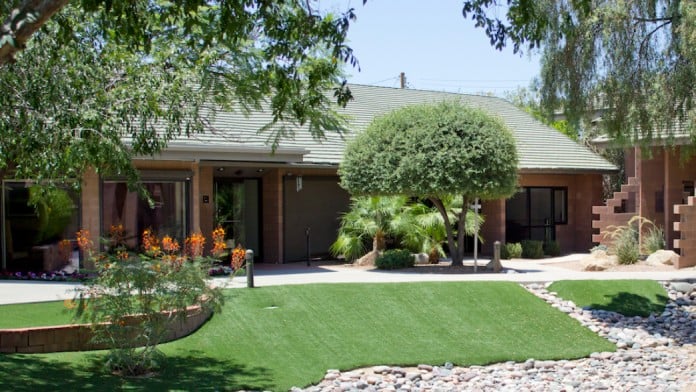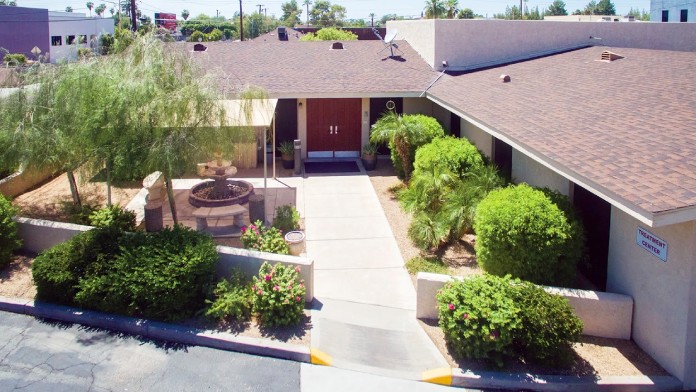About Desert Recovery Centers
Desert Recovery Centers located in Phoenix, Arizona provides you with quality mental health and addiction care. They have luxury facilities in both Glendale and Scottsdale to support adults. The staff can bring an important perspective to recovery as many of them have been in your shoes. With the use of evidence based practices and holistic therapies, Desert Recovery Centers is here to help you live a healthy life.
Dual Diagnosis Treatment
When struggling with the complexity of addiction and mental health conditions simultaneously, Desert Recovery Centers has the tools to create an individualized treatment plan that works best for you. Medication assisted treatment (MAT) is an option alongside evidence based therapies like cognitive behavioral therapy (CBT). Holistic therapies can be a part of treatment and include meditation, art and music therapy, and yoga.
Residential Treatment at the Centers
Both the Scottdale and Glendale centers offer residential treatment for alcohol and drug addiction. Unique amenities like the movie theater, pool, and prepared meals help create a feeling of home while in recovery. There are also resources for aftercare planning to support you in the months after treatment so you can stay connected and prevent relapse.
Outside of the centers are relaxing environments that can support you during all the steps of recovery. The South Mountain Park and Preserve has hiking and mountain biking trails and this can be a great way to participate in physical activity and spend time with people who are a part of your support system. The Desert Botanical Garden can also serve as a respite to immerse yourself in the comfort of nature.
Facility Overview
Rehab Score
Accepted Insurance
Other Forms of Payment
Private insurance refers to any kind of healthcare coverage that isn't from the state or federal government. This includes individual and family plans offered by an employer or purchased from the Insurance Marketplace. Every plan will have different requirements and out of pocket costs so be sure to get the full details before you start treatment.
Self-pay involves paying for treatment out of your own pocket. You can use savings or credit, get a personal loan, or receive help from family and friends to fund your treatment. If you don't have insurance or your insurance plan doesn't cover a specific program, self-pay can help ensure you still get the care you need.
Financing your treatment can make treatment more accessible. You'll work with your care provider to set up payment plans, including interest rates and repayment timelines. Financing options vary widely and not all programs offer them, so be sure to get the full details before enrolling in treatment. If you have insurance or other benefits, financing may help you cover your remaining out of pocket expenses.
Addiction Treatments
Levels of Care
 Inpatient
Inpatient
 Partial Hospitalization Program
Partial Hospitalization Program
 Intensive Outpatient
Intensive Outpatient
 Outpatient
Outpatient
Treatments
Alcohol use disorder (AUD), also referred to as alcoholism and alcohol addiction, is a chronic condition that involves craving alcohol and an inability to control drinking. A person with AUD must drink greater and greater amounts of alcohol to achieve the same effects and experiences withdrawal symptoms if they stop drinking alcohol. Several evidence-based methods are available to treat AUD through alcohol rehab in Arizona. This treatment can occur on an outpatient or inpatient basis.
Drug rehab in Arizona is the process of treating individuals who are dependent on a particular addictive drug. Because addiction is complex, this treatment typically includes a variety of interventions that address the many physical and emotional issues involved.
Dual-diagnosis addiction treatment in Arizona provides integrated care for individuals with co-occurring substance use disorders and mental health conditions. Services may include medically assisted detox, 12-Step recovery, intensive outpatient programs, and aftercare support. Addiction experts use evidence-based therapies, like cognitive behavioral therapy, or dialectical behavioral therapy, and trauma-focused therapy, to simultaneously address substance use and mental health disorders. This comprehensive approach to treatment helps to ensure sustained recovery.
Treatment for addiction includes mental health services that are provided while during your stay at the facility. This may be a hospital, clinic, or a luxury treatment center setting. You receive 24-hour support and monitoring by mental health counselors and clinical staff. Most inpatient programs last 30 days, but some can last for two months or longer. Mental health is addressed during treatment via group and individual counseling, addiction education programming, and often recreational activities.
Clinical Services
Also known as CBT, cognitive behavioral therapy in Arizona is one of the most common types of psychotherapy. It offers a structured method of counseling that effectively treats substance use disorder and dual diagnosis disorders.
Dialectical behavior therapy in Arizona focuses on acceptance of your reality and behaviors while also attempting to make changes in unhealthy behaviors. It has been shown to be effective for the treatment of anxiety, depression, PTSD, and substance use disorder.
Amenities
-
Gym
-
Massage Room
-
Basketball Court
-
Tennis Court
-
Swimming Pool
Accreditations

The Joint Commission, formerly known as JCAHO, is a nonprofit organization that accredits rehab organizations and programs. Founded in 1951, the Joint Commision's mission is to improve the quality of patient care and demonstrating the quality of patient care.
Joint Commission Accreditation: Yes
Contact Information
1623 W Moody Trail, Phoenix, AZ 85041






